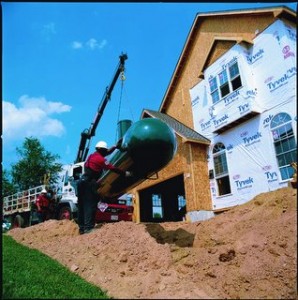Underground Propane Tanks
Underground Propane Tanks
 One of the benefits to using propane vs oil for your heating fuel is you can bury the tank underground instead of having an oil tank in your basement. I like using underground propane tanks for a number of reasons as I’ll point out in this post. If you’re building a new house or considering a change to propane then this is a good quick review of the issues.
One of the benefits to using propane vs oil for your heating fuel is you can bury the tank underground instead of having an oil tank in your basement. I like using underground propane tanks for a number of reasons as I’ll point out in this post. If you’re building a new house or considering a change to propane then this is a good quick review of the issues.
Underground propane (LPG) tanks must be installed according to local and state regulations. These regulations are typically similar to above ground tanks. Obviously the regulations protect your safety and the performance of the tank. The installation of underground tanks must also follow the provisions of NFPA 58, Section 3.2.9. Installing a propane tank underground will provide an aesthetically pleasing option compared to an above ground tank.
Typically the propane tank can be placed 10 feet from the house. You’ll want to choose a location that’s convenient for the delivery truck especially if you live in an area with lots of snow. When the tank is buried there is a small dome that protrudes above ground that allows access to the fill valve. Most home owners end up placing some type of landscaping feature around it to make it blend into the landscape.
Underground propane tanks are subject to corrosion from electrolysis. Electrical currents which occur naturally in the earth can corrode holes in unprotected tanks. The easiest way to protect the underground propane tank is to use cathodic protection. This is done by attaching a bag of magnesium (anode bag) to the tank with a wire. The anode bag releases electrons which protect the tank from electrolysis and corrosion. Check out the following link if you’d like a more detailed explanation of cathodic protection.
The other nice thing about a buried propane tank is you can install a nice big tank. I use a 500 gallon tank at my house and I could heat the house for the entire winter off two tank fills. Plus I have the added benefit of not worrying about having an oil tank rupture in my house and then dealing with an environmental disaster inside my home!













One more thing to consider is the source of fuel. Here in Western Mass, the propane companies own many of the in ground tanks in the yard (like a lease) and only the owner of the tank will fill it.
So we are forced to go with a company that charges us >70c per gallon more than the open market. No other companies will fill this in ground tank and we are trapped. They will only fill their own or customer-owned tanks. We use > 1000 gallons per year, so do the math. I looked last week and the open market price for LP was $2.35, company XX was charging their customers $2.49, our company, EO Osterman, is charging us $3.03!!!
Monopoly in our area. Check yours and see who owns the tank and liability. If you did not build your own house, you may be surprised to learn that you do not own your propane tank and may be forced to deal with a single supplier. I am thinking about converting from LP to oil to get out of this price fix.
Great info, Ken. I am building a home and this is a tremendous consideration. Many thanks. Cathi
I’m a builder in W. Mass also and am trying to find a supplier. My plumber can’t get the tanks and suppliers don’t want to get involved, so I’m looking to NH to buy a tank. It sounds like a pretty big racket if you ask me.
Who will be supplying the propane for the finished home? They should/must provide a tank as far as I’m concerned.
Hi,
I too am a contractor in western ma and am finding the same difficulties. My e-mail address is kipkomosa@comcast.net. I think you are right on target about it being a big racket. Feel free to write.
Who do you call or look for, to have a new tank installed and burried?
I currently have 2 tanks on the side of the house and need them out of the way, and out of the lock I’m in with thre supplier.
Typically those tanks are the property of the supplier unless you specifically purchased them. If you want to bury a tank you’ll need to figure out who you want to get the propane from first, then either have them supply the tank or you can buy it, then you have to hire someone to bury it. This is typically a site work contractor.
I have the same issue… I did move into a house where the propane tank is owned by the propane company. I also have a 30 year old house so I plan to change over to old. With Bioheat becoming an option and natural gas not in my area, oil seems to be the only viable option. Also the savings are huge based on my calculations.
I am preparing to install a propane fired backup generator at my home and need to upgrade my propane tank installation. I currently have a leased tank and intend to do what ever it takes to install a 500-1000 gallon underground propane tank that I own so I can purchase propane on an annual basis on the open Market.
I have checked the MGL and CMRs applying to tank ownership and it is legal for a licensed gas fitter to make such an installation and for home owners to own their own tanks in Massachusetts.
Has anyone accomplished this type of conversion in western Massachusetts and if you have was your gas fitter able to purchase at tank in Massachusetts or do he have to use a New Hampshire or New York tank supplier?